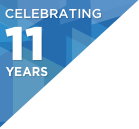Conference: Nov 5-7, 2018
Workshops: Nov 8–9, 2018
Track: Modern CS in the Real World
Applied trends in Computer Science that are likely to affect Software Engineers today. Topics include category theory, crypto, CRDT's, logic-based automated reasoning, and more.
Adam Wick leads the systems software group at Galois, Inc., an R&D company in Portland, OR. Galois does research in formal methods, programming language development, operating systems, compiler engineering, and security. Dr. Wick has worked in a variety of fields at all level of the software stack, from hardware synthesis to web applications, but has recently focused on network and operating system security. Amongst his current jobs, he is also the maintainer of the Haskell Lightweight Virtual Machine and oversees Galois' projects using this technology. @acwpdx
by Philip Wadler
Haskell, Type Theory, & Functional Programming Theory Contributor
The talk will explain why category theory is of interest for developers. The principle of Propositions as Types describes a correspondence between, on the one hand, propositions and proofs in logic, and, on the other, types and programs in computing. And, on the third hand, we have category theory! Assuming only high school maths, the talk will explain how categories model three basic data types: products (logical and), sums (logical or), and functions (logical...
by Isaac Potoczny-Jones
Founder @Tozny & Authentication and Privacy Specialist
More developers are writing cryptographic code, especially in regulated sectors like health care and financial services, but the code suffers from a combination of poor programming interfaces and a lack of developer training. In one study, 83% of cryptographic flaws (CVEs) were due to programmer misuse of otherwise correct libraries. While solutions like LetsEncrypt have made HTTPS cheaper, encryption of data in transit only covers a small part of the problem...
by Nathan Sobo
Founding Member of the Atom Editor Team @GitHub
Real-time collaborative editing gives users the illusion that they are editing the same document, but in reality, each collaborator makes edits to their own local replica of the document to ensure a low-latency typing experience. Each user's local operations must then be transmitted to remote collaborators and integrated so that the contents of every replica remain equivalent and that the intentions behind each participant's edits are preserved. This challenge has been the focus of nearly...
by Temesghen Kahsai
Software Engineer, previously Research Scientist @NASAAmes
Developing efficient and scalable software analysis tools is a tedious and very difficult task. First, due to the undecidability of the verification problem, tools, must be highly tuned and engineered to provide reasonable efficiency and precision trade-offs. Second, different programming languages come with very diverse assortments of syntactic and semantic features. Third, the diverse encoding of the verification problem makes the integration with other...
by Changhoon Kim
Director of System Architecture @Barefoot Networks
We all know how to program CPUs, making it easy to prototype new ideas, build new applications, and share them with others. Today it is commonplace to program not just CPUs, but almost any domain-specific processors, such as GPUs, DSPs, and even machine-learning accelerators (e.g., TPUs). Unfortunately networking has long been an exception to this trend; the network data plane -- packet processing -- has been dictated by fixed-function switching chips, which help...
.
Tracks
-
Architectures You've Always Wondered About
Architectural practices from the world's most well-known properties, featuring startups, massive scale, evolving architectures, and software tools used by nearly all of us.
-
Going Serverless
Learn about the state of Serverless & how to successfully leverage it! Lessons learned in the track hit on security, scalability, IoT, and offer warnings to watch out for.
-
Microservices: Patterns and Practices
Stories of success and failure building modern Microservices, including event sourcing, reactive, decomposition, & more.
-
DevOps: You Build It, You Run It
Pushing DevOps beyond adoption into cultural change. Hear about designing resilience, managing alerting, CI/CD lessons, & security. Features lessons from open source, Linkedin, Netflix, Financial Times, & more.
-
The Art of Chaos Engineering
Failure is going to happen - Are you ready? Chaos engineering is an emerging discipline - What is the state of the art?
-
The Whole Engineer
Success as an engineer is more than writing code. Hear inward looking thoughts on inclusion, attitude, leadership, remote working, and not becoming the brilliant jerk.
-
Evolving Java
Java continues to evolve & change. Track covers Spring 5, async, Kotlin, serverless, the 6-month cadence plans, & AI/ML use cases.
-
Security: Attacking and Defending
Offense and defensive security evolution that application developers should know about including SGX Enclaves, effects of AI, software exploitation techniques, & crowd defense
-
The Practice & Frontiers of AI
Learn about machine learning in practice and on the horizon. Learn about ML at Quora, Uber's Michelangelo, ML workflow with Netflix Meson and topics on Bots, Conversational interfaces, automation, and deployment practices in the space.
-
21st Century Languages
Compile to Native, Microservices, Machine learning... tailor-made languages solving modern challenges, featuring use cases around Go, Rust, C#, and Elm.
-
Modern CS in the Real World
Applied trends in Computer Science that are likely to affect Software Engineers today. Topics include category theory, crypto, CRDT's, logic-based automated reasoning, and more.
-
Stream Processing In The Modern Age
Compelling applications of stream processing using Flink, Beam, Spark, Strymon & recent advances in the field, including Custom Windowing, Stateful Streaming, SQL over Streams.
-
Performance Mythbusting
Real world, applied performance proofs across stacks. Hear performance consideratiosn for .NET, Python, & Java. Learn performance use cases with OpenJ9, Instagram, and Netflix.
-
Tools and Culture: What's Beyond a Stack of Containers?
Containers are not just a techology. It's a platform. Push your knowledge.
-
Web as Platform
All things Browser, from JavaScript Frameworks for animation and AR / VR to Web Assembly and from protocol work to open standards evolution.
-
Beyond Being an Individual Contributor
Beyond being an individual contributor. Building and Evolving managers and tech leadership.
-
Building Great Engineering Cultures
Why engineering culture matters. Track features org scaling, memes as a culture tool, Ally skills, and panels on diversity / inclusion.
-
Hardware Frontiers: Changes Affecting Software Developers Today
Topics around: Quantum computing, NVM, SMR, GPU, custom hardware, self-driving cars, and mobile hardware.




